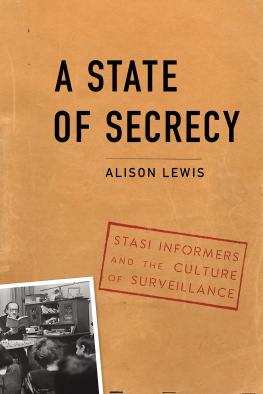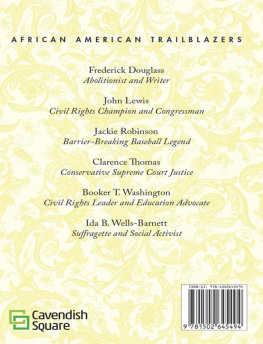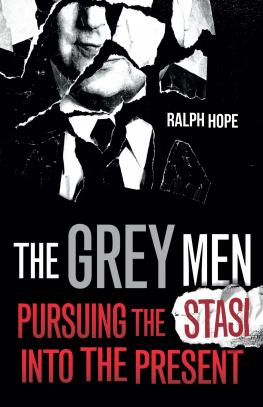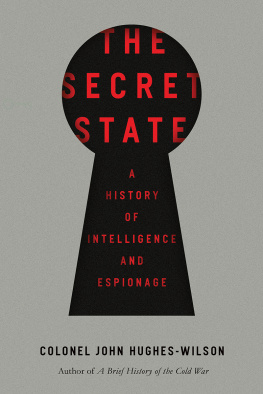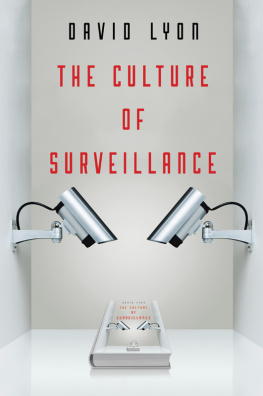This is the validation of Alison Lewiss remarkable ability to extract meaning from East Germanys Stasi files and to convey the insights shes gained to her readers in an enthralling manner. For readers discovering her writing now, A State of Secrecy will be an eye-opener.... This book is indispensable reading for all Cold War buffs.
Corina L. Petrescu, associate professor of German at the University of Mississippi
In telling the story of five informers, Alison Lewis reveals the culture of surveillance that the Stasi purposefully created and emphasizes the ways in which the Stasi used this particular group of informers as an instrument of the states cultural diplomacy and as a weapon in the war against the subversive activities of the West, particularly West Germany.... Eloquent.
Mary Kathryn Barbier, author of Spies, Lies, and Citizenship: The Hunt for Nazi Criminals
Alison Lewis exposes aspects of Stasi infiltration into cultural circles with revelatory nuance. Her genius lies not only in groundbreaking archival research but also in putting those discoveries to stunning and complex effect. Reads like a thriller. A dazzling achievement.
Susan Signe Morrison, professor of English at Texas State University
A State of Secrecy is a compelling work that anyone interested in the GDR must read. With a balance of patient, in-depth research, ruthlessly clearsighted analysis, and psychological intuition, Alison Lewis lays bare the dynamics of secrecy in the GDR, but more important, the mechanisms that sustain totalitarianism in the modern world. An intellectual tour de force and a read as gripping as the extraordinary stories contained within it.
Karen Leeder, professor of modern German literature at New College, Oxford
Carefully fording the gaps inherent in secret police files, Alison Lewis tells fascinating Cold War stories about Stasi informers who were instrumental in influencing literary production and policing culture in East Germany. Extensively researched, A State of Secrecy is an important book that shines a light on the shadowy double lives of agents who were saddled with secrets. It exposes the extent of their collaboration and surveillance activities, as well as their habitus, motivation, and recompenses.
Valentina Glajar, professor of German at Texas State University
A State of Secrecy presents an inside look into the East German Ministry for State Security and its employment of writers as unofficial collaborators. Alison Lewis traces the intersecting biographies of five Stasi collaborators across the spectrum of informers deployed in the area of literature and culture. By presenting in-depth portraits of these personalities and the different kinds of surveillance they were involved in, A State of Secrecy paints a fabulous picture of a collective biography of Stasi informers within the cultural sphere, their motivations, and their justifications, clearly explicating how the Stasi used humane forms of surveillance to control and curtail cultural expression for nearly forty years.
Carol Anne Costabile-Heming, professor of German at the University of North Texas
Lewis takes a frank look at the Stasi apparatus and the literary writers who became its willing informants out of ideological persuasion, literary envy, or both, and who so often have been simultaneously demonized and glamorized. The study exposes the cruel banality of the socialist surveillance regime.
Cathy Gelbin, professor of film and German studies at the University of Manchester
2021 by Alison Lewis
Cover designed by University of Nebraska Press; cover photo Deutsche Fotothek / Harald Hauswald.
Author photo Klaus Fritsche.
All rights reserved. Potomac Books is an imprint of the University of Nebraska Press.
Library of Congress Cataloging-in-Publication Data
Names: Lewis, Alison, 1958 author.
Title: A state of secrecy: Stasi informers and the culture of surveillance / Alison Lewis.
Description: Lincoln: Potomac Books, an imprint of the University of Nebraska Press, 2021. | Includes bibliographical references and index.
Identifiers: LCCN 2021008006
ISBN 9781640123793 (hardback)
ISBN 9781640124844 (epub)
ISBN 9781640124851 (pdf)
Subjects: LCSH : Germany (East). Ministerium fr StaatssicherheitHistory. | Intelligence serviceGermany (East)History. | Authors as spiesGermany (East) | InformersGermany (East)
Classification: LCC JN 3971.5. A 56 I 615 2021 | DDC 327.1243/100922dc23
LC record available at https://lccn.loc.gov/2021008006
The publisher does not have any control over and does not assume any responsibility for author or third-party websites or their content.
The impetus for this project goes back over thirty years to 1986, when I was an overseas student granted a short-term study visa to travel to the German Democratic Republic (GDR). I was working on my dissertation on the feminist writer Irmtraud Morgner and had been accepted by a study scheme designed to allow research stays for international doctoral students from Western countries. Coming from Australia, which had been among the first countries to officially recognize the GDR, I was accepted into the program and permitted to move freely around the libraries in East Berlin and German literature classes in the fall of 1986. Like many of the schemes the politburo introduced in the last decade of the regime, this one aimed to capitalize on the expanding interest among international scholars in East Germany. In reality it was a scheme to earn hard currency and was driven by economic necessity. I paid three hundred U.S. dollars for a four-week stay, during which I had access to the premises of the Humboldt University and to mentoring from experts in my field, such as the Germanist scholar Professor Eva Kaufmann.
During this time I became more aware of the grassroots cultural scene that was spreading below the threshold of official culture throughout the 1980s. Through contacts I was given I was alerted to a vibrant underground nurtured by the Protestant churches and increasing numbers of discontented citizens who were throwing caution to the wind and mobilizing in novel ways. At that time I also gained a brief glimpse of a potentially vast secret police apparatus that underpinned this new openness and semblance of tolerance toward the West. As I was later to learn, the rich seam of underground culture I found myself in the midst of was secretly being mined and undermined by the Stasi in ways that few were aware of at the time. Fortunately, none of my daily contacts proved to be Stasi informants, but one of their much-admired associates was: Sascha Anderson. In many of my conversations with East Germans the name of Sascha Anderson was invoked repeatedly as a beacon of hope and a less orthodox form of culture. For many Anderson was the spokesman of his generation, a literary voice whose star was in the ascendancythat is, until the fall of the Berlin Wall when it was revealed that he was not a rising star but one in the process of imploding.
This project sets out to explore the secret surveillance society that enabled, controlled, and subverted cultural life in the GDR. It arose out of earlier studies that I conducted on the impact of Stasi informers on the art and politics of the Prenzlauer Berg underground. The focus of this book emerged out of a need to know more about the dynamic and conflicted nature of writers collaboration with the Stasi and their complex motivations. My principal starting point was the records of the Ministry for State Security, which provided a revealing canvas upon which to trace the narratives of Stasi informers lives.

